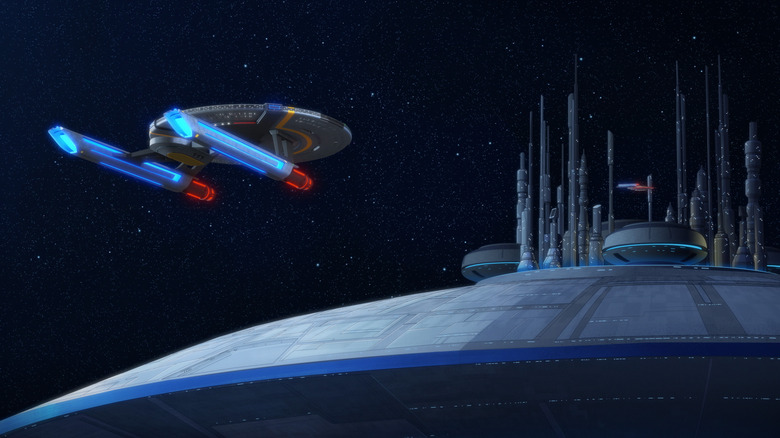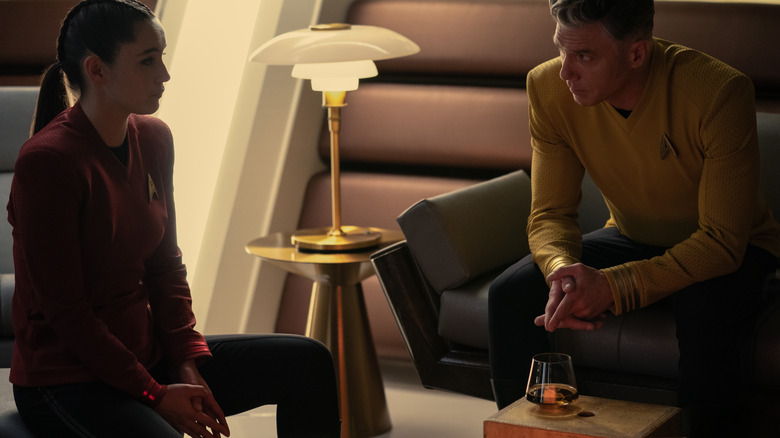Star Trek Boss Alex Kurtzman Knows The Best (And Worst) Ways To Make New Shows
It's been a long road, getting from there to here.
When CBS All Access launched in 2017, it was to reboot "Star Trek" with a brand new, ambitious, big-budget series called "Star Trek: Discovery." This release model also mirrored the debut of "Star Trek: Voyager" in 1995, which helped to launch the UPN. As such, many Trekkies reeled. "Discovery" was to be the first "proper" Trek series since the cancelation of "Star Trek: Enterprise" in May of 2005 (the two J.J. Abrams feature films were mere stop-gaps set in a parallel universe). While "Discovery" opened to a lot of enthusiasm, it was plagued by production notes and late-stage re-workings that saw it changing hands several times. "Discovery" had more producers on it than cast members. The show's first season played itself out to the dismay of Trekkies everywhere who bristled at the show's violence, lack of episodic structure, absent sense of diplomacy, and generally rushed, bad writing.
Sensing that many viewers only signed up for CBS All Access, later Paramount+, in order to see "Star Trek," the network debuted "Short Treks," a series of brief, unconnected episodes that could be made on the cheap and dropped on the streaming service once a month to string along subscribers until the next season could debut. It felt very inorganic.
"Star Trek" head honcho Alex Kurtzman, in an interview printed in the most recent issue of SFX Magazine, wanted to assure fans that no shows moving forward will bear a similarly mercenary feeling. After grappling with the franchise for several years, "Star Trek" seems to have hit a stride, with seasons of "Lower Decks," "Strange New Worlds," and the most recent "Picard" being much better than what came before. Kurtzman will no longer force the issue, waiting for good ideas to come.
The sheer glut of Trek
Back in the franchise's heyday of the 1990s, any two "Star Trek" shows were in production at the same time. Due to 1990s broadcast schedules, a season of TV warranted 24 episodes, rather than a modern streaming milieu which usually only demands ten, or even eight in some cases. Because of the shorter seasons, however, Kurtzman has overseen the production of many "Star Trek" shows simultaneously. If one counts "Short Treks," there are currently six Trek programs on at the same time (there's also "Discovery," "Picard," "Lower Decks," "Prodigy," and "Strange New Worlds"). All told, there are 52 new episodes of Trek a year.
Kurtzman said the growth to such a large number was organic, feeling that he was exploring possibilities, rather than mapping everything out. Indeed, volume wasn't a concern at all. In his words:
"I think it's organically happened that way. We certainly set out to do a lot of 'Star Trek,' but, I've said this before, and I'll say it here: we are not aiming to be in the volume business. I don't think that serves 'Star Trek' at all. Obviously, we're in a moment in the consumption of streaming culture where more is more, and the faster you can turn shows around, the more you can hold an audience. Obviously, we have to play that game because that's the game that franchises play."
The model for the Marvel Cinematic Universe has spread to many other notable entertainment franchises, and others have felt the need to "churn out," to use Kurtzman's words, a great deal of output. "Star Wars" is a good example of this. It seems, however, that overexposure can indeed happen, and Kurtzman was eager to avoid the traps.
Contentedness, not content
Speaking to that philosophy, Kurtzman said:
"[T]he worst way to play that game is just to churn things out. To churn them out, not because we have a reason to turn them out. We will never let a show go forward ... where we can't all look at each other and say we're ready to hold hands and dive into this together because we know this is a great story that's worth telling."
Indeed, the current spate of "Star Trek" shows aren't closely connected. While "Strange New Worlds" was spun off of "Discovery," it seems clear that crossovers and "worldbuilding" wasn't a mandate. Kurtzman wanted it known that no such mandate existed. Modern Trek was all growing from what seemed doable and what seemed like a good idea at the time. Unlike the MCU, there was no timeline and there was no map. The events from one show would never bleed into the others. Perhaps this is why each new Trek show seems to be set so far apart from the others. Kurtzman said:
"There are no corporate mandates with 'Star Trek.' [...] We don't get told, This is what we need from your 'Star Trek' and that makes a big difference. Because when we sit down with showrunners, the first question I ask them is, 'Why do you love Trek? And what Trek story do you want to tell?' ... It's very, very clear to me with all of our showrunners that they love Star Trek because it means something to them personally, and they understand how much it means to the world."
In true Trek philosophy, it's about story and it's about passion. It is not about "creating content." Kurtzman only happens to have made a lot of episodes by good chance.


